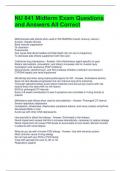NU 641 Midterm Exam Questions
and Answers All Correct
Methotrexate side effects when used in RA DMARDs (trexall, otrexup, rasuvo) -
Answer- Hepatic fibrosis
Bone marrow suppression
GI ulceration
Pneumonitis
Can cause fetal abnormalities and fetal death (do not use in pregnancy)
To decrease side effects supplement with folic acid
Colchicine drug interactions - Answer- Anti-inflammatory agent specific for gout
Statins (atorvastatin, simvastatin, and others) increases risk for muscle injury
Cyclosporin and ranolazine (PGP inhibitors)
Ketoconazole, clarithromycin, and HIV protease inhibitors (nelfinavir and ritonavir)
CYP3A4 hepatic and renal impairment
Monitoring test when using hydroxychloroquine for RA - Answer- Antimalaria actions;
does not slow disease progression but can improve long-term outcomes
Thorough opthalmocologic exam before treatment and annual eye exams with risk
factors every five years with no risk factors
EKG for prolonged QT intervals
Every 4-8 weeks reevaluation to see if symptoms are controlled or if drug toxicity is
present
Methadone side effects when used to treat addiction - Answer- Prolonged QT interval
Severe respiratory depression
constipation, drowsiness, diaphoresis, peripheral edema, and rarely cardiac arrhythmia
Decreased libido in men
Avoid use with other CNS depressants
How penicillin's affect the kidneys - Answer- Eliminated in the kidneys
Renal impairment causes half-life to increase dramatically- necessary to reduce dosage
Renal impairment can cause PCN levels to accumulate to toxic levels. Monitor function
in patients with renal dialysis
What do you do with a known PCN allergy - Answer- Use with extreme caution
Most common cause of drug allergy
Do not treat with any PCN or PCN family
Treat with epinephrine (sub Q, IM, or IV)
Respiratory support
, Admin drug and watch patient for 30 minutes to ensure anaphylaxis occurs.
Administer in a safe setting for first dose and monitor patient
Drugs useful in treating Gram + Cocci - Answer- PCN G or PCN V
Oxacillin and nafcillin
Vancomycin, erythromycin, and clindamycin
Ampicillin
Piperacillin and Augmentin
Amoxicillin
Cephalosporin
Tetracycline
Carbapenems
Sulfonamides
Fluoroquinolones: ciprofloxin
Drugs used for treating MRSA - Answer- Skin and soft tissue infections
Vancomycin, linzolid (zyvox), daptomycin, telavancin, clindamycin, and ceftarolin
IV vancomycin and daptomycin preferred in children
Pneumonia: vancomycin, linezolid, and clindamycin
For bacteria or endocarditis: IV Vancomycin and daptomycin
Ineffective MRSA drugs - Answer- Tetracyclines, clindamycin,
trimethoprim/sulfamethoxazole, and B lactams except for ceftaroline
Common drugs for UTIs - Answer- Urinary tract antiseptics: nitrofurantoin (Macrobid)
and methenamine
Urinary tract antiseptics: nitrofurantoin (Macrobid) and methenamine
Enterococcus faecium infection - Answer- Ampicillin, amoxicillin, PCN G
Metronidazole-alcohol interactions - Answer- Disulfiram-like reactions (diaphoresis,
palpitations, facial flushing, nausea, vertigo, hypotension, and tachycardia)
Alcohol must be avoided
Cephalosporins used to treat meningitis - Answer- 3rd generation cephalosporin's
Cedax, suprax, ceftriaxone (Rocephin), Omnicef, spectracef, vantin, cefotaxime
Cephalosporin side effects - Answer- Hypersensativity reactions (macupapular rash)
If signs and symptoms of allergy appear (urticaria, rash, hypotension, and difficulty
breathing) discontinue immediately
Do not give to patients who have anaphylaxis to PCNs
Disulfiram reactions with alcohol use
Promote bleeding interferes with vitamin K, do not give with patients taking
anticoagulants, NSAIDs, thrombolytics, or other antiplatelets drugs
All cephalosporins can promote C diff infections




